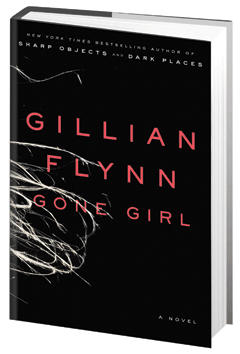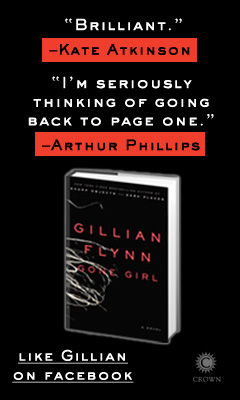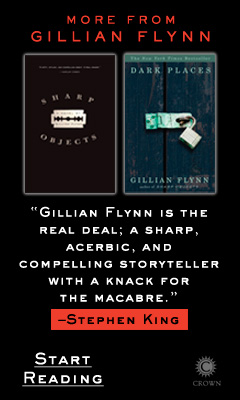Gone Girl
by Gillian Flynn
To write about Gillian Flynn's excellent new novel is to face a unique challenge. The plot is riddled with so many twists and turns that describing it, even in broad strokes, runs the risk of giving some of them away; it would be a real disservice to deny any reader the joy of slowly peeling away the layers of deceits wrapped around its deliciously dark heart. Any character or plot detail could be a spoiler. Or not. And this is part of the genius of Gone Girl, where Flynn places her readers on a sea of constantly shifting sand. What is real? Who is telling the truth? Is this review a lie? Reader beware.
On the day of their fifth wedding anniversary, beautiful Amy Elliott Dunne (the inspiration for her parents' wildly successful children's book series, Amazing Amy) disappears from the sterile Missouri house she shares with her husband, Nick. A neighbor calls Nick, who is at the bar he owns and runs with his sister Go, and tells him to come home, that something seems amiss. Nick finds the front door wide open, the iron on, signs of a struggle in the living room, and a freshly mopped floor in the kitchen. The police--not nearly as dumb as Nick first believes--draw what seems an inevitable conclusion; the husband did it. Nick agrees that he looks guilty and--the ultimate unreliable narrator--admits to being a liar right away. Is Nick a killer? Could it be that simple?

Amy's diary, which is doled out in pieces as the investigation into her disappearance progresses, might hold some clues. Here it emerges that Amy wasn't happy about their move from New York City to Nick's boyhood home in Missouri and was distressed by how distant and brutish her husband had become over the past five years. Their marriage had degenerated so much, Amy writes, that she was beginning to get a little frightened of his dark moods. Nick, naturally, tells a different story. According to him, it was Amy who had changed, becoming cold and bitter, not at all the vibrant, cool girl he'd fallen in love with. How, he asks himself--and us--could he be blamed for...? When Amy's distraught, loving parents show up to join the search, it is clear that even they are not who they seem to be. In fact, if there is one thing that Nick and the missing Amy agree on, it is that the Elliots pilfered and exploited Amy's childhood for their own gain.
Our sympathies and suspicions pinball as Flynn thickens her plot with an expert hand. Just before she disappeared, Amy had completed an anniversary ritual; a treasure hunt of clues leading her husband to his gift. When Nick embarks on this quest, desperately trying to find Amy and clear his name, he begins to uncover some disturbing information about certain people in Amy's past and, at the same time, finds himself falling in love with his missing wife all over again. It is at this moment that Nick's much younger mistress emerges and Amy's "best friend" informs Nick--and the world at large--that Amy was pregnant when she vanished. And then things get really complicated.
Gone Girl delivers in spades the thrill and suspense that define Flynn's work, but it also speaks eloquently to the state of things today. Spiked with many sharply funny moments, the novel is reminiscent of Warren Adler's 1981 black comedy The War of the Roses, which detailed the destruction and rancor of divorce using the fight over material possessions as metaphors for greed and bitterness. Flynn has moved this situation to the present time, when the American dream--so seemingly accessible in the 1980s--is in tatters. Indeed, the strain of losing their jobs and subsequent financial hardship is much of what drives a wedge between Amy and Nick. This is a brilliant reimagining of an old theme. Breaking up is hard to do but, as Flynn shows us, staying together can be even harder. Her stunning portrait of a marriage collapsing in on itself like a black hole is a tour de force in miniature.
It is a rare breed of writer who can combine suspense, an intricately crafted plot and deeply developed characters without sacrificing nuance, but Flynn makes it look easy. Moreover, her characters are completely believable, which is to say they aren't always likeable. In fact, they are often unpleasant in banal, unsexy ways--just like real people. This is an incredible risk for a novelist and an even bigger risk for a novelist writing female characters; the conventional wisdom is that characters that are unlikeable will alienate readers. It is additionally challenging to write fiction this dark and utterly compelling now, in an age when the truth is often so much stranger and darker. Yet it is here that Gillian Flynn excels. Gone Girl is her best work yet. --Debra Ginsberg








